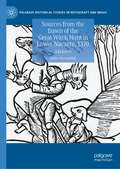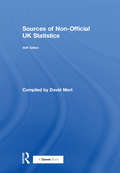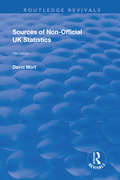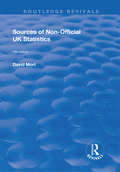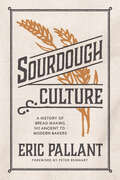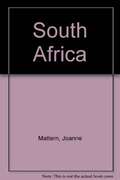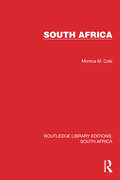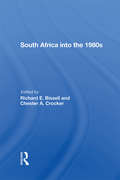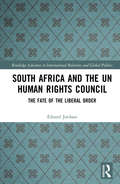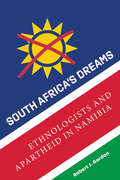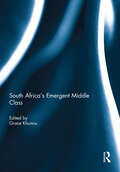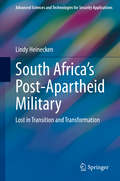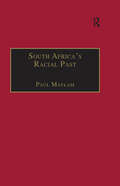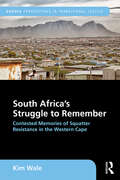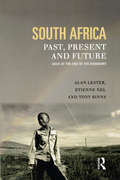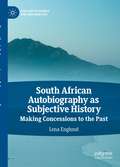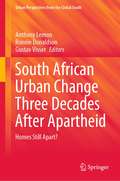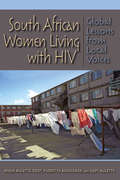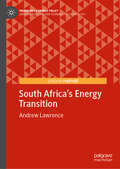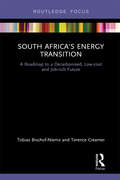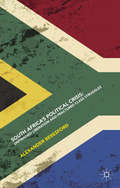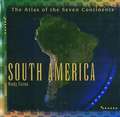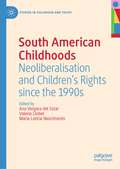- Table View
- List View
Sources from the Dawn of the Great Witch Hunt in Lower Navarre, 1370: Akelarre (Palgrave Historical Studies in Witchcraft and Magic)
by Ander BerrojalbizThis book provides an annotated source edition of the only two extant documents related to the sorcery trial brought against Pes de Guoythie and Condesse de Beheythie in Lower Navarre, in 1370. It provides full transcriptions of both documents, and English translations of the most salient passages. These sources illustrate at an early date many of the features prevalent in later sources on which trials, such as the metamorphosis of those accused into animals; infanticide; poisoned apples; collective meetings; and ointments made from various creatures. As such, it offers a fascinating insight into allegations of witchcraft in the High and Late Middle Ages.
Sources of Non-Official UK Statistics
by David MortFirst Published in 2017. This volume gives details of nearly 1000 publications and services (including electronic publications) produced by trade associations, professional bodies, banks, consultants, employers' federations, forecasting organizations and others, together with statistics appearing in trade journals and periodicals. Titles and services are listed alphabetically by publisher and each entry contains information, where available, on subject, content and source of statistics, as well as frequency and cost, and address, telephone and fax details for further information. This updated edition also includes details of internet sites and information on whether statistics are available on those sites.
Sources of Non-official UK Statistics
by David MortThis title was first published in 2002: This volume gives details of nearly 1000 publications and services (including electronic publications) produced by trade associations, professional bodies, banks, consultants, employers' federations, forecasting organizations and others, together with statistics appearing in trade journals and periodicals. Titles and services are listed alphabetically by publisher and each entry contains information, where available, on subject, content and source of statistics, as well as frequency and cost, and address, telephone and fax details for further information. This updated edition also includes details of internet sites and information on whether statistics are available on those sites.
Sources of Non-official UK Statistics (Routledge Revivals)
by David Mort Brent SohngenThis title was first published in 2002: This volume gives details of nearly 1000 publications and services (including electronic publications) produced by trade associations, professional bodies, banks, consultants, employers' federations, forecasting organizations and others, together with statistics appearing in trade journals and periodicals. Titles and services are listed alphabetically by publisher and each entry contains information, where available, on subject, content and source of statistics, as well as frequency and cost, and address, telephone and fax details for further information. This updated edition also includes details of internet sites and information on whether statistics are available on those sites.
Sourdough Culture: A History of Bread Making from Ancient to Modern Bakers
by Eric Pallant“A culinary mystery story leavened with Pallant’s passion, charm, and devotion to the ageless allure of the risen loaf.” —Aaron Bobrow-Strain, author of White BreadSourdough Culture presents the history and rudimentary science of sourdough bread baking from its discovery more than six thousand years ago to its still-recent displacement by the innovation of dough-mixing machines and fast-acting yeast. Environmental science professor Eric Pallant traces the tradition of sourdough across continents, from its origins in the Middle East’s Fertile Crescent to Europe and then around the world. Pallant also explains how sourdough fed some of history’s most significant figures, such as Plato, Pliny the Elder, Louis Pasteur, Marie Antoinette, Martin Luther, and Antonie van Leeuwenhoek, and introduces the lesser-known—but equally important—individuals who relied on sourdough bread for sustenance: ancient Roman bakers, medieval housewives, Gold Rush miners, and the many, many others who have produced daily sourdough bread in anonymity.Each chapter of Sourdough Culture is accompanied by a selection from Pallant’s own favorite recipes, which span millennia and traverse continents, and highlight an array of approaches, traditions, and methods to sourdough bread baking. Sourdough Culture is a rich, informative, engaging read, especially for bakers—whether skilled or just beginners. More importantly, it tells the important and dynamic story of the bread that has fed the world.“Pallant deftly covers a wide breadth of time and place in Sourdough Culture, interweaving experts’ research with his own travels, research, and experiments.” —Pittsburgh City Paper“A tour de force of social, economic, political, and gastronomic history that is both meticulously researched and highly readable.” —Stanley Ginsberg, author of The Rye Baker
South Africa (Reading Essentials in Social Studies: Country Connections)
by Joanne MatternDiscover South Africa, a country with four distinct ethnic groups that are finally coming together after years of segregation.
South Africa (Routledge Library Editions: South Africa #4)
by Monica ColeOriginally published in 1961, this book was the first comprehensive work on South African geography that also presented a balanced account of all facets of the economic life. It was written to provide background information on South Africa – the nature of the country, its resources and deficiencies, its historic settlement by peoples of different races and of the progress made and the difficulties encountered in the major areas of economic activity: agriculture, mining, manufacturing and trade. In discussing these factors the book acknowledged that in South Africa the complexities of the relationships between peoples of different racial origins and widely differently economic and cultural standards are met in one country.
South Africa Into The 1980s
by Chester A. Crocker Richard E BissellThe question of South Africa's future has become a paramount issue in global politics. This book examines the position of South Africa as it faces the 1980s—its strengths, its weaknesses, and the probable influences of other states on South Africa in the years to come. The authors share a common interest in an analytical approach to a topic often argued with more emotion than rationality. They discuss South Africa's internal situation, with particular emphasis on the interests and aspirations of the political parties competing for power; then they focus on external realities, looking at the country's ability to project influence abroad as well as the power of others to affect events within it. In sum, they highlight crucial trends shaping South Africa's current and future development.
South Africa and the UN Human Rights Council: The Fate of the Liberal Order (Routledge Advances in International Relations and Global Politics)
by Eduard JordaanThis book provides a detailed analysis of South Africa’s actions on the UN Human Rights Council, examining the country’s positions on civil and political rights, economic rights and development, social groups whose rights are frequently violated, and abuses in specific countries. The most detailed and comprehensive study of any country’s record on the UN Human Rights Council to date, this book demonstrates that despite occasional support for human rights, South Africa’s overall record ranged from opposing to failing to support human rights. This is compounded by an anti-Western or ‘anti-imperial’ edge to South Africa’s positions on the UNHRC. Using South Africa as a study case of a liberal country consistently behaving illiberally, this book therefore challenges the widespread belief in international relations theory, typically found in liberal and constructivist thought, that there is an alignment of domestic political society and foreign policy values. Addressing ongoing debates since the presidency of Nelson Mandela about the place of human rights in South Africa’s foreign policy, South Africa and the UN Human Rights Council will be useful to students and scholars of international relations, human rights, international law, and African politics.
South Africa's Dreams: Ethnologists and Apartheid in Namibia
by Robert J. GordonIn the early sixties, South Africa’s colonial policies in Namibia served as a testing ground for many key features of its repressive ‘Grand Apartheid’ infrastructure, including strategies for countering anti-apartheid resistance. Exposing the role that anthropologists played, this book analyses how the knowledge used to justify and implement apartheid was created. Understanding these practices and the ways in which South Africa’s experiences in Namibia influenced later policy at home is also critically evaluated, as is the matter of adjudicating the many South African anthropologists who supported the regime.
South Africa's Dreams: Ethnologists and Apartheid in Namibia
by Robert J. GordonIn the early sixties, South Africa’s colonial policies in Namibia served as a testing ground for many key features of its repressive ‘Grand Apartheid’ infrastructure, including strategies for countering anti-apartheid resistance. Exposing the role that anthropologists played, this book analyses how the knowledge used to justify and implement apartheid was created. Understanding these practices and the ways in which South Africa’s experiences in Namibia influenced later policy at home is also critically evaluated, as is the matter of adjudicating the many South African anthropologists who supported the regime.
South Africa's Emergent Middle Class
by Grace KhunouThis book is drawn from diverse studies that grapple with Black Middle Class experiences in contemporary and historical South Africa. The chapters present research from diverse disciplines, and tackle issues related to being black and middle class, using both quantitative and qualitative approaches. Like many other social phenomena, the black middle class concept is seen as complex and not easy to pin down. As a result, conceptualizations from these chapters are dynamic and relevant for understanding the position of the black middle class in contemporary South African society. An interesting dynamic explored by contributors is the critical engagement with the usually reductionist notions of black middle class experiences as ahistorical, homogenous experiences of a group of conspicuous consumers. These limiting notions are unpacked and repositioned in how the book is structured. This book was published as a special issue of Development Southern Africa.
South Africa's Post-Apartheid Military: Lost in Transition and Transformation (Advanced Sciences and Technologies for Security Applications)
by Lindy HeineckenThis timely book examines how the South African National Defence Force has adapted to the country’s new security, political and social environment since 1994. In South Africa’s changed political state, how has civilian control of the military been implemented and what does this mean for ‘defence in a democracy’? This book presents an overview of the security environment, how the mission focus of the military has changed and the implications for force procurement, force preparation, force employment and force sustainability. The author addresses other issues, such as: · the effect of integrating former revolutionary soldiers into a professional armed force · the effect of affirmative action on meritocracy, recruitment and retention · military veterans, looking at the difficulties they face in reintegrating back into society and finding gainful employment · gender equality and mainstreaming · the rise of military unions and why a confrontational, instead of a more corporatist approach to labour relations has emerged · HIV/AIDS and the consequences this holds for the military in terms of its operational effectiveness. In closing, the author highlights key events that have caused the SANDF to become ‘lost in transition and transformation’, spelling out some lessons learned. The conclusions she draws are pertinent for the future of defence, security and civil-military relations of countries around the world.
South Africa's Racial Past: The History and Historiography of Racism, Segregation, and Apartheid (Research in Migration and Ethnic Relations Series)
by Paul MaylamA unique overview of the whole 350-year history of South Africa’s racial order, from the mid-seventeenth century to the apartheid era. Maylam periodizes this racial order, drawing out its main phases and highlighting the significant turning points. He also analyzes the dynamics of South African white racism, exploring the key forces and factors that brought about and perpetuated oppressive, discriminatory policies, practices, structures, laws and attitudes. There is also a strong historiographical dimension to the study. It shows how various writers have, from different perspectives, attempted to explain the South African racial order and draws out the political and ideological agendas that lay beneath these diverse interpretations. Essential reading for all those interested in the past, present and future of South Africa, this book also has implications for the wider study of race, racism and social and political ethnic relations.
South Africa's Struggle to Remember: Contested Memories of Squatter Resistance in the Western Cape (Europa Perspectives in Transitional Justice)
by Kim WaleTransitional justice studies typically focuses on how nations remember, face and deal with histories of past violence. This book, however, shifts the frame from national discourses of transitional justice onto local memory actors who attempt to engage with these broader systems of meaning from below. The case study is based on the memory struggles of individuals and groups who are attempting to gain access to the discourses and benefits associated with dominant memory identities of ‘victim’ and ‘veteran’ in the context of post-transition South Africa. They share a common history of squatter resistance in the Western Cape in the 1980s and a common struggle for inclusion in dominant memory frameworks. The main theme of this book is the politics of memory, as it relates to the conversation between national and local memory. Integrated within this theme is the further theme of alternative histories and counter-memories of struggle from below. In focusing on counter memories of violence and transition this book aims to tell a different version of South African liberation history in relation to the dominant narrative. It analyses local memory actors' attempts to bring their lived histories into conversation with national discourses of reconciliation and the national liberation struggle. In doing so it unpacks a memory paradox occurring within these narratives, which highlights the politics of inclusion and exclusion within the frames of transitional justice knowledge. On the one hand this alternate story exposes the paradox between local and national memory while on the other hand it brings into focus the local experience of the intersection between international transitional justice discourses and national transition politics. This book will be of local and international interest to scholars and students in the field of transitional justice, memory politics, national liberation struggle and South African historiography. It will also be of interest to a broader South Africa public, as it offers a deeper understanding of South Africa’s history, which challenges taken for granted transitional justice frames of knowledge.
South Africa, Past, Present and Future: Gold at the End of the Rainbow?
by Tony Binns Alan Lester Etienne NelThis is the first book to combine a discussion of post-apartheid development initiatives with an extended historical analysis of South Africa's dynamic race, class, gender and ethnic identities. Bringing together the research of an historical geographer and two development geographers, the book enables us to locate the post-apartheid transition in a broad historical and spatial perspective. Within this perspective, the limitations as well as the achievements of South Africa's current transformation are highlighted.
South African Autobiography as Subjective History: Making Concessions to the Past (African Histories and Modernities)
by Lena EnglundThis book examines 21st-century South African autobiographical writing that addresses the nation’s socio-political realities, both past and present. The texts in focus represent and depict a South Africa caught in the midst of contradictory and competing images of the ‘Rainbow Nation’. Arguing that recent memoirs question and criticize the illusion of a united nation, the study shows how these texts reveal the flaws and shortcomings not only of the apartheid past but of contemporary South Africa. It encompasses a broad range of autobiographical works, largely published since 2009, that engage with South Africa’s past, present and future. At its centre is the quest for space and belonging, and this book investigates who can comfortably ‘belong’ in South Africa in its post-apartheid, post-Truth and Reconciliation, post-Mbkei and post-Zuma state.
South African National Cinema (National Cinemas)
by Jacqueline MaingardSouth African National Cinema examines how cinema in South Africa represents national identities, particularly with regard to race. This significant and unique contribution establishes interrelationships between South African cinema and key points in South Africa’s history, showing how cinema figures in the making, entrenching and undoing of apartheid. This study spans the twentieth century and beyond through detailed analyses of selected films, beginning with De Voortrekkers (1916) through to Mapantsula (1988) and films produced post apartheid, including Drum (2004), Tsotsi (2005) and Zulu Love Letter (2004). Jacqueline Maingard discusses how cinema reproduced and constructed a white national identity, taking readers through cinema’s role in building white Afrikaner nationalism in the 1930s and 1940s. She then moves to examine film culture and modernity in the development of black audiences from the 1920s to the 1950s, especially in a group of films that includes Jim Comes to Joburg (1949) and Come Back, Africa (1959). Jacqueline Maingard also considers the effects of the apartheid state’s film subsidy system in the 1960s and 1970s and focuses on cinema against apartheid in the 1980s. She reflects upon shifting national cinema policies following the first democratic election in 1994 and how it became possible for the first time to imagine an inclusive national film culture. Illustrated throughout with excellent visual examples, this cinema history will be of value to film scholars and historians, as well as to practitioners in South Africa today.
South African Urban Change Three Decades After Apartheid: Homes Still Apart? (GeoJournal Library)
by Ronnie Donaldson Gustav Visser Anthony LemonThis book provides an analysis of South African urban change over the past three decades. It draws on a seminal text, Homes Apart, and revisits conclusions drawn in that collection that marked the final phases of urban apartheid. It highlights changes in demography, social as well as economic structure and their differential spatial expression across a range of urban sites in South Africa. The evidence presented in this book points to a very complex set of narratives in urban South Africa and one that cannot be reduced to a singular statement so the conclusions of the various investigations are in many ways open. As urban apartheid represented one clear outcome, its post-apartheid urban legacies varies greatly from city to city. As such this book is a great resource to students and academics focused on urban change in South African cities since the demise of apartheid, and scholars of urban policy-making in South Africa and Southern urbanists generally.
South African Women Living with HIV
by Anna Aulette-Root Floretta Boonzaier Judy AuletteBased on interviews with women who are HIV positive, this sobering pandemic brings to light the deeply rooted and complex problems of living with HIV. Already pushed to the edges of society by poverty, racial politics, and gender injustice, women with HIV in South Africa have found ways to cope with work and men, disclosure of their HIV status, and care for families and children to create a sense of normalcy in their lives. As women take control of their treatment, they help to determine effective routes to ending the spread of the disease.
South Africa’s Energy Transition (Progressive Energy Policy)
by Andrew LawrenceThis book provides a succinct overview of the evolution of policies addressing energy and climate justice in South Africa. Drawing on a range of analytical perspectives, including socio-technical studies, just transitions, and critical political economy, it explains why South Africa’s energy transition from a coal-dependent, centralised power generation and distribution system has been so slow, and reveals the types of socio-political inequalities that persist across regimes and energy sources. Topics explored include critical approaches to the South African state and its state-owned energy provider, Eskom; the political ecologies of coal and water; the politics of non-renewable energy alternatives; as well as the trajectory and fate of the Renewable Energy Independent Power Producers Procurement Programme (REIPPPP), the country’s major renewable energy policy. The book concludes with reflections on alternative, neglected energy and development paths, suggesting how the political economy of South Africa’s energy system could be further transformed for the better.
South Africa’s Energy Transition: A Roadmap to a Decarbonised, Low-cost and Job-rich Future (Routledge Focus on Environment and Sustainability)
by Tobias Bischof-Niemz Terence CreamerSouth Africa’s energy transition has become a highly topical, emotive and politically contentious topic. Taking a systems perspective, this book offers an evidence-based roadmap for such a transition and debunks many of the myths raised about the risks of a renewable-energy-led electricity mix. Owing to its formidable solar and wind resources, South Africa has an almost unparalleled opportunity to turn solar photovoltaic and onshore wind generators into the country’s power generation workhorses – a role hitherto played by coal. This book shows that a renewables-led mix will not only provide the lowest cost, but will also create more jobs than any of the alternatives currently under consideration. In addition, it offers a glimpse of how South Africa’s low-cost and decarbonised electricity system can power a competitive industrial economy, an electric-mobility revolution and, in the long run, create new export opportunities. This book will be of great interest to energy industry practitioners, as well as students and scholars of energy policy and politics, environmental economics and sustainable development.
South Africa’s Political Crisis: Unfinished Liberation and Fractured Class Struggles
by Alexander BeresfordSouth Africa's current political upheavals are the most significant since the transition from apartheid. Its powerful trade unions are playing a central role, and the political direction they take will have huge significance for how we understand the role of labour movements in struggles for social justice in the twenty-first century.
South America (The Atlas Of The Seven Continents)
by Wendy VierowSouth America lies entirely in the Southern Hemisphere. It is home to many natural and man-made wonders, including the Andes, the world s longest mountain range at about 5,000 miles long; the Amazon, the world s second longest river at about 4,000 miles long; and São Paulo, Brazil, the city with 9,785,640 people, the third largest city population in the world.
South American Childhoods: Neoliberalisation and Children’s Rights since the 1990s (Studies in Childhood and Youth)
by Ana Vergara del Solar Valeria Llobet Maria Letícia NascimentoThis edited volume concerns childhood throughout South America after the 1990s, a period and territory of special complexity marked by the beginning—or intensification of—political neoliberalisation throughout the region. The decade also saw the ratification of the International Convention on Rights of the Child and post-dictatorial processes of political and social democratisation. The editors of this book explore the tension this juxtaposition has generated between logics and processes of dissimilar orientations. Within this framework, chapters investigate the neoliberalisation and institutionalisation of children’s rights and consider similarities and differences with respect to other regions. They also explore changes in schools and educational systems, as well as the phenomenon of the internal and external child and family migration.
